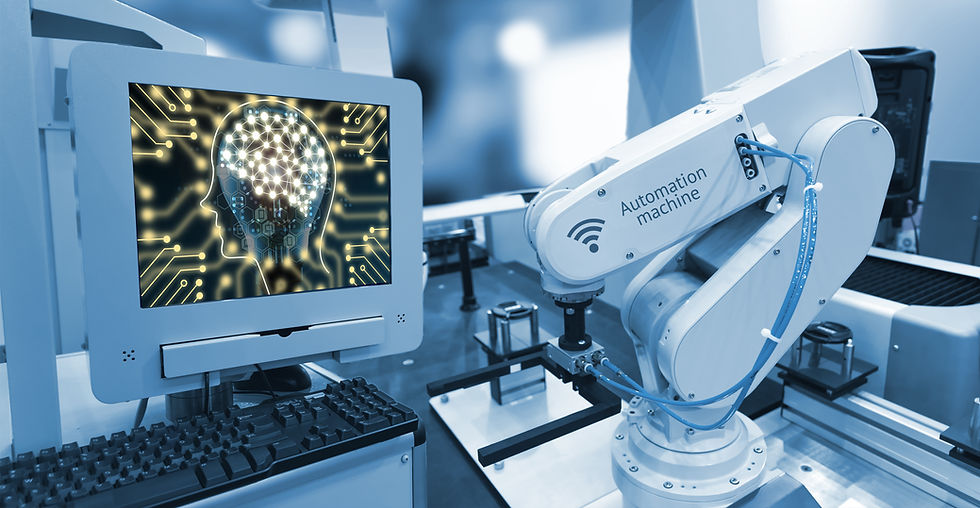Artificial Intelligence
- SidLinx
- Jan 28
- 4 min read
"AI will be the most transformative technology since electricity." - Eric Schmidt

In my teenage years I read many science fiction short stories, written by Arthur C Clark, Isaac Asimov, and Robert A Heinlen, among others. One story asked about intelligence and how do you define it? The author, I can’t remember who, suggested that a block of wood mounted on wheels, rolled into a wall, could be considered intelligent. I didn’t agree but it was food for thought.
What is Artificial Intelligence (AI)?
“The term ‘artificial intelligence’ means a machine-based system that can, for a given set of human-defined objectives, make predictions, recommendations or decisions influencing real or virtual environments.” National Artificial Intelligence Act of 2020. The field of AI is wide ranging, from a block of wood to a computer on your desk to an autonomous robot. I’m familiar with an AI app loaded in a computer performing tasks in seconds that would take a human to do in a much, much longer time frame.
Recent History
In 1950, Alan Turing devised a test comparing a machine’s ability to perform tasks that were indistinguishable from that performed by a human. In 1956 John McCarthy coins the phrase “artificial intelligence. Up to the 1970s early AI gaming and language programs are written. In the 1980s more sophisticated programming systems are written to imitate the way human experts make decisions. In the 1990s speech recognition and computer vision come to the fore. From 2010 onwards the development of computer chips more powerful than ever allow for large databases to be used in deep learning for games, languages and vision.
How AI Will Affect Our Lives
I cannot think of any area of life where AI will not impact upon our lives. Economic, social, personal, health, war, environment, sport, the list goes on. AI will have some effect, small or even life changing.
Work and Employment: AI will automate many tasks; accounting, legal, personnel, logistics, finance, are all tasks that AI will automate. New job opportunities will arise, just what they will be I do not know. If the industrial revolution is any indicator, new jobs will be created.
Healthcare: If in the USA the cost of having a baby runs into the thousands, $25k say some, AI will help by reducing costs in all the areas mentioned earlier. Disease diagnosis, personalized treatment plans, are just two areas in which AI will be of benefit to all. Healthcare costs are a far bigger issue than people realize. AI will revolutionise healthcare.
Transportation: Tesla, BYD or someone else will profit tremendously if a safe self-driving car is first to market. All have some form of driver assistance; AI will enhance those capabilities. Meantime Uber and traditional taxi companies will use AI-powered traffic management systems to improve services to their customers. AI will revolutionize personal and freight transportation, making them safer and more efficient.
Education: AI can develop education programs customised to include cultural, religious and academic perspectives for every student in the country’s education system.
Entertainment: AI virtual characters we already see on social platforms. Most are incredibly realistic and will only get better. Music playlists will be created to suit your tastes as AI analyses your selections.
Daily Life: Siri and Alexa your personal AI assistants will continue to improve as will other smart home devices.
Potential Concerns and Challenges:
The loss of existing jobs is a big concern for all industries. Big brands in fashion retail have closed thousands of stores around the world, not because of AI but because of the cost of living and how people choose to shop, either online or in recycled stores. Worldwide AI will eliminate millions of administration roles in every business, adding to the concerns of governments.
Bias and fairness in AI are huge concerns. Bias and discrimination prejudices can creep into AI if clear, open discussions are had before policies are put in place surrounding to avoid or minimise the impact of prejudices. Ethics go hand in hand in keeping bias out and fairness in place, with the use of AI.
Privacy and security are concerns in existing systems with platforms obligated to protect and secure the information they legally collect. AI makes privacy and security at the top of any AI.
Conclusion
AI is rapidly transforming our world and much faster than anybody has anticipated. A Chinese team released an AI, DeepSeek R1, during Christmas season 2024. After testing DeepSeek R1by several independent parties, each concluded that this AI, DeepSeek R1, has caught up to Open AI’s Chat GPT. The cost for the Chinese team, $5m, using outdated hardware due to the restrictions placed by the USA. Under-resourced the Chinese have built a comparable product without the billions available to Open AI. DeepSeek R1 has another big advantage, it can teach itself without human intervention, just like the game Go. Go is unbeatable by any human player.
AI has tremendous potential to improve all our lives in many ways. It is critical the AI industry, governments and other stakeholders, address the ethical and societal challenges to ensure that AI is developed responsibly and not create existential issues for humanity.
Sources and related content
Julia McCoy, YouTube. 2025 ASI Race: Open AI v DeepSeek.
Comentários